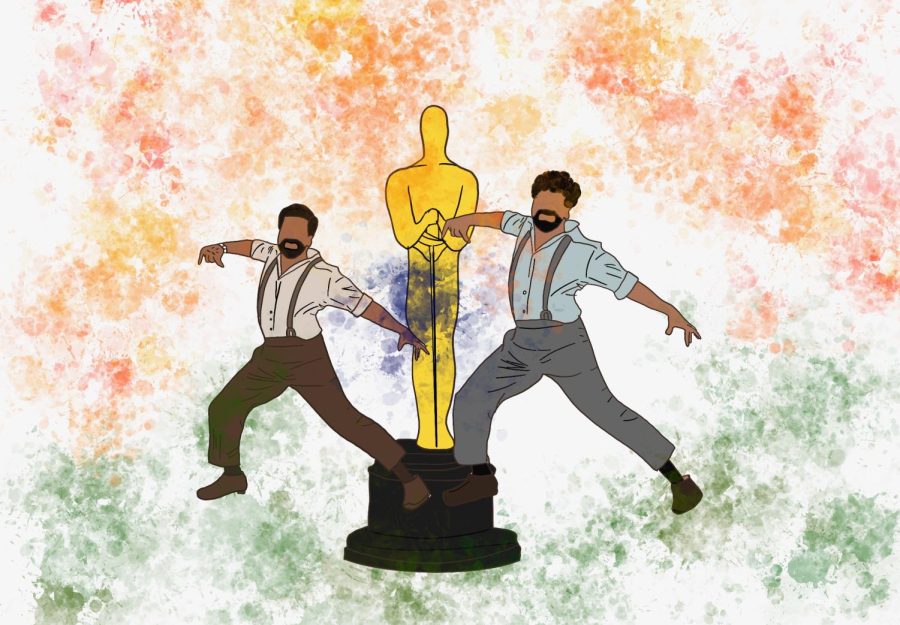The significance of ‘Naatu Naatu’’s Oscar win for India
An illustration of the choreography in “Naatu Naatu,” which inspired a variety of dance trends on Instagram and TikTok. This song won at this year’s Academy Awards for Best Original Song, making it the first Indian film song to be both nominated for and win an Oscar.
“Not salsa, not flamenco, my brother … Do you know Naatu?”
And with the pulsating beat of drums, the tune of a mandolin and bright vocals, the concept of “Naatu” comes to life. As I sat in my theater chair last April, eyes glued to the scene on the screen and surrounded by the exuberant song “Naatu Naatu” echoing from the speakers, I felt a sense of Indian pride bubbling within me. This same song won at this year’s Academy Awards for Best Original Song on March 12, making it the first Indian film song to be both nominated for and win an Oscar.
“Naatu Naatu” is just one of the many numbers in the soundtrack of “RRR,” a film by S.S. Rajamouli set in 1920s colonialist India. The plot follows the impassioned rivalry between a tribal warrior and Indian officer in the British police. While the movie presents a variety of songs, from soulful to empowering, “Naatu Naatu” made waves internationally, garnering 17 million views in its original language, Telugu, and 35 million views in five different languages within 24 hours of its release on YouTube. It inspired a variety of dance trends on Instagram and TikTok with its jiglike step choreographed by Prem Rakshith, becoming a hit with international audiences. The song also collected a variety of accolades for Best Original Song in the Golden Globe Awards, Critics’ Choice Awards, Hollywood Critics Association and, most recently, the Academy Awards.
But what does “Naatu” actually mean? In Indian languages Telugu or Tamil, it can mean both “dance” or “nation” and “raw.” And while it initially appears like just a play on words, the song’s title embodies the shared sentiment of Indian honor: the notion that national strength is rooted in pride for culture and shared traditions. Composer MM Keeravani and lyricist Chandrabose built the song as a representation of freedom fighters battling and breaking British colonial rule through dance, combining the musicality of classical Telugu folk songs with lyrics reminiscent of childhoods in India. Depicting the imagery of a local festival, afternoons under the shade of a Banyan tree and the trill of a bird, the song is a reflection of the rawest form of culture and tradition. The song also tells a story from the presentation of Indian dance to a finale of comradery between former rivals and triumph.
Perhaps this nativity is what makes the song’s win so significant. For decades, Indian cinema has been grouped into a single category, most commonly regarded as Bollywood, which primarily refers to Hindi-language films. This western perspective often blends Indian cinema into one homogenous category, disregarding the small local differences that shape the meaning of a movie.
Yet as the song took the stage at the Oscars and actress Deepika Padukone presented its performance, the difference which American television often neglected took shape: “Naatu Naatu” isn’t Bollywood, it’s a representation of Telugu-language film and a step towards recognition for South Indian film overall. It’s a win for India to be seen as a diverse group of regions, each bringing their own flavor to the table. Within the energizing beats of the song is a call, a call to embrace our local and national culture — one to “listen to our song.”

Ananya Sriram (12) is a co-managing editor for the Winged Post, and this is her fourth year on staff. This year, Ananya hopes to bond more with members...


















![“[Building nerf blasters] became this outlet of creativity for me that hasn't been matched by anything else. The process [of] making a build complete to your desire is such a painstakingly difficult process, but I've had to learn from [the skills needed from] soldering to proper painting. There's so many different options for everything, if you think about it, it exists. The best part is [that] if it doesn't exist, you can build it yourself," Ishaan Parate said.](https://harkeraquila.com/wp-content/uploads/2022/08/DSC_8149-900x604.jpg)




![“When I came into high school, I was ready to be a follower. But DECA was a game changer for me. It helped me overcome my fear of public speaking, and it's played such a major role in who I've become today. To be able to successfully lead a chapter of 150 students, an officer team and be one of the upperclassmen I once really admired is something I'm [really] proud of,” Anvitha Tummala ('21) said.](https://harkeraquila.com/wp-content/uploads/2021/07/Screen-Shot-2021-07-25-at-9.50.05-AM-900x594.png)







![“I think getting up in the morning and having a sense of purpose [is exciting]. I think without a certain amount of drive, life is kind of obsolete and mundane, and I think having that every single day is what makes each day unique and kind of makes life exciting,” Neymika Jain (12) said.](https://harkeraquila.com/wp-content/uploads/2017/06/Screen-Shot-2017-06-03-at-4.54.16-PM.png)








![“My slogan is ‘slow feet, don’t eat, and I’m hungry.’ You need to run fast to get where you are–you aren't going to get those championships if you aren't fast,” Angel Cervantes (12) said. “I want to do well in school on my tests and in track and win championships for my team. I live by that, [and] I can do that anywhere: in the classroom or on the field.”](https://harkeraquila.com/wp-content/uploads/2018/06/DSC5146-900x601.jpg)
![“[Volleyball has] taught me how to fall correctly, and another thing it taught is that you don’t have to be the best at something to be good at it. If you just hit the ball in a smart way, then it still scores points and you’re good at it. You could be a background player and still make a much bigger impact on the team than you would think,” Anya Gert (’20) said.](https://harkeraquila.com/wp-content/uploads/2020/06/AnnaGert_JinTuan_HoHPhotoEdited-600x900.jpeg)

![“I'm not nearly there yet, but [my confidence has] definitely been getting better since I was pretty shy and timid coming into Harker my freshman year. I know that there's a lot of people that are really confident in what they do, and I really admire them. Everyone's so driven and that has really pushed me to kind of try to find my own place in high school and be more confident,” Alyssa Huang (’20) said.](https://harkeraquila.com/wp-content/uploads/2020/06/AlyssaHuang_EmilyChen_HoHPhoto-900x749.jpeg)



